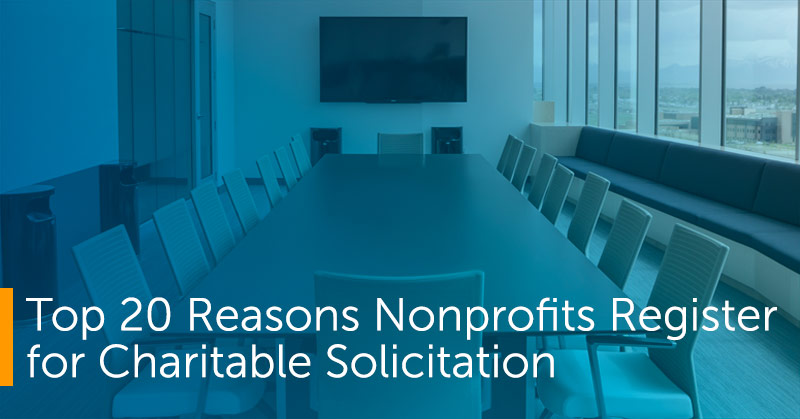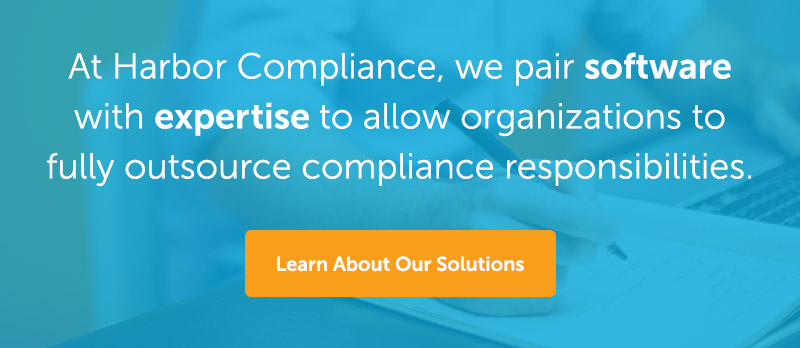-
Software
Compliance Software
Oversee licenses, track renewals, access documents, and more from a single interface.
Software Overview -
Services
Compliance Services
Full service compliance solutions for organizations throughout their entire lifecycles.
Services Overview -
Industries
-
Partner
- Information Center
Top 20 Reasons Nonprofits Register for Charitable Solicitation

Updated December 2020
State charitable solicitation requirements affect nearly every charity that fundraises in at least some way. Simply being recognized by the IRS as a 501(c)(3) organization does not mean that a charity can fundraise limitlessly. Most states also regulate charitable solicitation. Forty-one states require charities to register to solicit funds. Charities must pay close attention to state solicitation requirements to stay compliant, avoid penalties, and maintain credibility with their donors.
In this article, we’ve compiled the top twenty reasons why organizations register for charitable solicitation. This list is by no means exhaustive, nor do these reasons apply to every organization in every state. Most organizations will find that at least some items on this list apply to their situation. Our goal is simply to get you, your development team, and your board of directors thinking about how the requirements apply to your organization.
The first six reasons affect most organizations.
1. Being incorporated in a state that requires registration
The odds are that your charity is incorporated in one of the 41 states that require charitable solicitation registration. The state of incorporation is likely where many of your board members reside and where your charity solicits funds and receives donations. If your organization has not yet reviewed the requirements in your incorporation state, this should be your priority.
2. Soliciting in any of the 41 states
State requirements apply when a charity solicits donations from residents of that state. Many nonprofits solicit without being aware of that state’s registration requirements, sometimes for years. If you have solicited from residents in a state and plan to continue, review that state’s requirements and register as needed. Some states assess a penalty for registering after solicitation has begun.
3. Receiving donations in certain states
Regardless of solicitation activities, states often have separate standards that apply when donations are received. Some states, like California, require registration within 30 days of receiving assets. Other states consider “repeated” and “substantial” gifts from a state enough to trigger registration. This gray area causes headaches for charities of all types and sizes. It’s best to review your organization’s fundraising footprint and decide on a proactive registration strategy, which could include partnering with an expert compliance team to manage your fundraising registrations and renewals.
4. Avoiding bad PR
Like California, Virginia, and Pennsylvania, many states post public lists of delinquent, illegitimate, or fraudulent charities. Negative PR from the states or the media can undermine fundraising efforts and harm a charity’s brand. Nonprofit executives and boards should take great care to avoid any negative PR that can stem from noncompliance.
5. Protecting the reputation of officers and directors
Staying compliant with charitable solicitation requirements also helps your charity protect the reputation of its officers and directors. Negative PR reflects poorly on the leadership and can lead to personal embarrassment. This is especially true for large charities whose board members are often high profile industry, government, and business leaders, but also holds true for smaller organizations.

6. Maintaining credibility with donors
Donors and grantmakers alike can use online state registries to search for your charity before making a donation or awarding a grant. When your organization is registered and up-to-date with its renewals, it will appear in the public records as active and in “good standing.” If you do not register and a prospective donor performs a search for your charity, you may lose the donation and not even know it.
These reasons relate to the location of your personnel.
7. Officers and directors living in different states
In an internet-driven, interconnected world, it is increasingly common that board members, officers, and volunteers live in different states. Often, charities solicit donations in states by virtue of the location of their personnel. Therefore, you may face registration requirements in those states.
8. Chapters, offices, or affiliates in various state
Many state applications require information on whether your charity has other offices, affiliates, or chapters soliciting under your organization’s name. You’ll typically provide a current list to the state charitable solicitation authority each year. At the same time, solicitation may take place from these locations. In other words, if you have a presence in a state and you have not registered to solicit funds, take a look at the state’s requirements right away.
Many state requirements apply to the specific ways your charity fundraises.
9. Sending direct mailings
Mail is perhaps the most cut-and-dry form of solicitation, at least as it relates to the registration requirements. If the address on the envelope is in a particular state that requires registration, generally speaking, you are soliciting in that state. You may also have to navigate state-specific disclosure requirements, which most states require.
10. Applying for grants
Applying for grants is considered a solicitation in most states. Typically, solicitation is deemed to occur in the state in which the grantmaker is located. Some grant applications require proof of state charitable solicitation registration. For that reason, organizations that apply for grants in various states can find themselves registering in several states. You can read more about state registration requirements when applying for grants in this post.
11. Sending email campaigns
Email is a terrific, inexpensive way to reach donors anywhere in the country. However, the IRS and most states consider email a form of solicitation, which is often enough to trigger registration requirements. Send email solicitations intelligently. Ideally, you would identify where the recipients of the emails live so that you can segment your lists, register in those states, and include the appropriate disclosure statements.
12. Making phone calls
Like sending mail and email, making telephone calls to residents of a state is often sufficient to trigger registration. Pay attention, as states often have specific disclosure requirements for charities making telephone solicitations. If you use a third-party telemarketing company or call center, you may need to report to state charity officials the details of that relationship.
13. Running radio and television ads
Nonprofits using radio and television to ask for donations will often face the need to register in states where the solicitations are broadcast. Given the broadcasting range of these solicitation types, you may need to register in more than one state.
14. Hosting fundraising events
Whether your charity organizes a golf tournament, a bake sale, or a gala, you may need to register before hosting the event, especially if it takes place in another state. The time it takes to become registered in a given state ranges from a few days to a few months, so be sure to account for the processing of applications as you plan your event.
15. Holding auctions, bingo, raffles, and games
Many states, such as West Virginia, Oregon, and Arkansas, want to know whether your charity holds auctions, raffles, and games of chance. If you conduct or plan to conduct any of these types of solicitation, you may be required to register. Often, you’ll be required to obtain state and local gaming licenses as well.
16. Soliciting online
Your nonprofit’s website can be a massive driver of charitable giving. However, having a “Donate Now” button on your website leads to a host of questions related to compliance. In some states, like Florida, simply having the “Donate Now” button means that charities must register in that state. In other states, receiving “repeated” and “substantial” donations triggers the requirement. For a more in-depth look at online fundraising requirements, download our free Online Fundraising Compliance Guide.
17. Contracting with a professional solicitor, fundraising consultant, or a commercial co-venture
Suppose your nonprofit has hired a professional to raise funds on your organization’s behalf or to assist with your fundraising strategy. In that case, you are required to register in states like Louisiana (which otherwise has a voluntary registration requirement). Commercial co-ventures, such as the Yoplait yogurt partnership with various charities supporting women’s cancer awareness, can also trigger similar registration requirements.
Your charity will face extra scrutiny upon registration, and you will have to submit contracts and other details about the relationship between your charity and the third party. In most cases, states require professional solicitors to register on their own, so make sure you are working with a compliant individual or organization.
If any of these final three situations apply, consider registering immediately.
18. Getting a donation “randomly” then following up with a solicitation
Suppose you receive an unsolicited check in the mail or a contribution through your website from another state. This gift in itself usually is not enough to trigger registration. However, suppose you use that individual’s contact information and send follow-up requests for a gift (by any of the above methods). In that case, you are soliciting that individual, and state solicitation requirements take effect.
19. Receiving a request from an individual, corporation, or foundation
With more and more solicitations arriving every day, donors can and do ask for proof of 501(c)(3) exemption and state charitable registration at any time. Many have come to expect disclosure statements on the letters they receive. Registration and disclosures help donors become informed about who is asking for a gift, where their money goes, and if the charity is legitimate. If an individual, a corporation, or a foundation asks for proof of registration, and you do not have it, consider registering so as not to lose their donation or your credibility with them.
20. Getting a letter or notice from a government agency
Perhaps the most compelling reason to register is receiving a letter from a state charity official indicating expiration, suspension, or delinquency. If a donor filed a complaint against your charity, or your registration lapsed because you didn’t file a renewal application on time, take action immediately. Contacting the state directly or utilizing a service company to act as a liaison will help you get answers and remedy the situation. Compliance violations and penalties don’t go away by ignoring them, so take swift action to avoid making matters worse.
Take a step back to move forward.
It’s time for an introspective look at your charity’s fundraising activities. How many of the 20 requirements apply to your organization? Is your organization already registered based on the applicable requirements? If the answer isn’t a resounding “Yes!” it’s time to take action. Prioritize registrations where most of your activities occur, where most of your donors live, where most of your gifts come from, but work towards full compliance. By being proactive with charitable solicitation registration, you can help your organization pursue its mission responsibly, help reinforce your organization’s credibility, and achieve greater fundraising success!
Our approach is to pair software with expertise to allow organizations to fully outsource their responsibilities. Regardless of what stage an organization is in, we follow the best practices we’ve learned through our extensive experience to help ensure organizations are compliant while minimizing their time and financial investment. Learn about how you can put your compliance on autopilot with our nonprofit compliance solutions.







